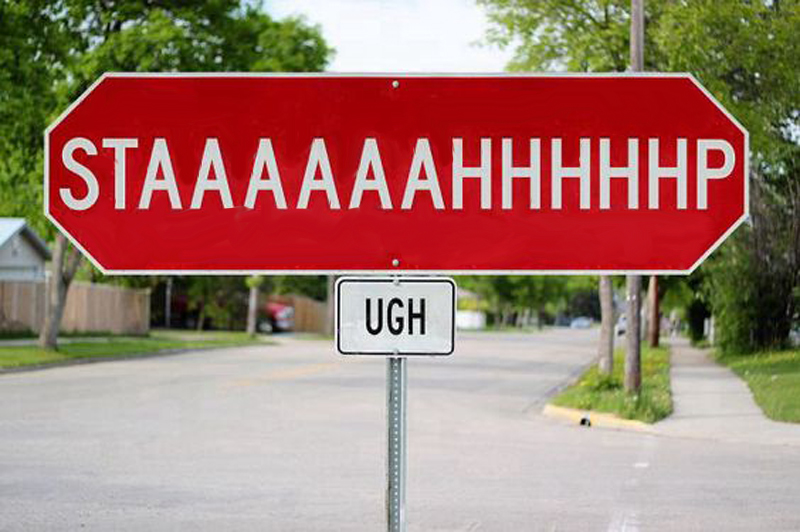I confess: Usually when I read articles by atheists criticizing other atheists, I feel annoyed and maybe a little betrayed. “Why,” I ask myself, “are we picking on each other for atheism-ing wrong when we should be calling out public officials for governing wrong, and religious leaders for morality-ing wrong?”
Why indeed. Secularism may be the single most effective means of improving human rights around the globe, considering that oppression of women, discrimination against LGBT people, racism, limitations on women’s reproductive freedom, and many other injustices result from the injection of religious doctrine into public policy. That is why it pains me so to see those who should be comrades in arms obstructing this noble and important endeavor, and what leads me to become what I once disdained: An atheist calling for her fellows to just cut this shit out.
1. Saying faith is harmless.
This is what evolutionary biologist and author Jerry Coyne refers to as “the little people argument:” That you are too sophisticated to have need of comforting lies, but the unwashed masses need something to hold onto. If we put aside the condescension inherent in such a pronouncement, we are still left with a statement that is demonstrably false. Religion has for centuries served as justification for oppression and atrocities and continues to do so today. “No no,” you say, “the real cause is greed / imperialism / desire for power / psychological phenomena / something-else-totally-not-related-to-religion.” This excuse fails in two ways: First, because it ignores the convenient cover (not to mention the vast resources) that religion, as an institution, provides for those who would exploit it for their own worldly ends; and second, because it discounts the sincerity of those who hurt others, intentionally or not, as a result of doing what they truly believe is ordained by god. In a world where children die because their parents pray over them instead of taking them to the doctor, the claim that faith is harmless is both empirically untrue and callously indifferent to those who have, in fact, been harmed by faith.
2. Conflating criticism of religion with hatred of religious people.
I have been told more than once by other atheists something along the lines of, “You can’t separate criticism of Religion X from criticism of followers of Religion X. Their beliefs are who they are, so if you say Religion X is bad, you are saying THEY are bad.” And woe unto him who dares speak ill of Islam, which will precipitate anguished cries of Islamophobia, racism, and accusations that you are indicting every Muslim on the face of the earth because of the actions of a radical few.
Sigh. How many times must we explain this? A religion is a set of ideas. It is an ideology. It is NOT a person. Ideas don’t have rights or feelings. Ideas cannot and should not be immune from criticism, and certainly not ideas that form the basis of governments, shape cultural norms, and otherwise directly affect the lives of billions of humans – including humans who do not share those ideas. No one gets upset when I say that I think licorice is disgusting, because they know I am not passing judgment on people who like licorice as also disgusting. Why is it, then, that when I say that I think the Bible, or the Qur’an, or the Torah are nonsense, all of a sudden it means I must thereby despise all people who follow them?
3. Hating on Richard Dawkins.
We get it. He isn’t good at Twitter. He can be condescending. He occasionally loses his patience. Maybe his writing style doesn’t set you on fire. That all leads me to the question: So the fuck what? Dawkins is an accomplished scientist and, like it or not, the path we secularists now tread has been cleared in no small part by Dawkins and others like him who have refused to remain silent: Silent about the existence and rights of non-believers, about the falsity of religious claims about the universe, about the irrationality and injustice of religious privilege. I have to wonder to what degree some criticisms are sour grapes over the success he has had as a public skeptic, and how much of it is simple accommodationism – a means for some critics to ingratiate themselves with the religious majority so as not to end up on the wrong side of their considerable power and influence (not to mention wrath). Does Dawkins occasionally step in it? Sure. Is it fair that he just rubs some people the wrong way? That’s bound to be the case with any public figure. But Dawkins-bashing has become something of a status symbol, a way for wannabe skeptical superstars to flout their intellectual bona fides like Hollywood ingénues who just happen to show up at all the right clubs. (A recent example of this phenomenon can be found here.) At any rate, Dawkins is not going anywhere and his contributions to science and the process of questioning That Which We Dare Not Question are irrefutable. Don’t like him? Great. But for the love of all that is chocolatey, STFU about it already.
4. Claiming that atheism is “dogmatic.”
A commenter on a science page said to me recently, “While I share your criticisms of Judeo-Christian explanations, [atheists hold] that any belief in the existence of a non-corporeal world undetectable in the corporeal world is an indication of intellectual shortcomings and a deflection of responsibility. This is an equally dogmatic concept.” Uh, wrong.
First, this is a generalization which simply doesn’t hold up, as is so often the case with generalizations. It’s probably true that some atheists think this, but since atheists are as diverse a group as anyone else, there is very little one can claim that “atheists” hold other than a non-belief in a god or gods. Second, even for those atheists who do think this way, this is still not dogma. Dogma is “a principle or set of principles laid down by an authority as incontrovertibly true” that “serves as part of the primary basis of an ideology or belief system,” according to Wikipedia. Further, I most often see claims of dogmatic atheism when atheists refuse to yield to arguments that offer either no compelling evidence or no evidence at all – but dismissing an unfalsifiable proposition for which there is precisely zero evidence is not remotely the same as dismissing a proposition because it contradicts a closely held belief. In other words, don’t cry about dogma when your opponent is simply siding with the evidence.
5. Pretending that trust in science is identical to faith in the supernatural.
This is an offense similar to item 4 in which those who hold that science is the best method for understanding the universe are accused of “worshipping science” (or even worse, of the dreaded “scientism”) as though it were an infallible deity (such as we see here). It is a silly enough accusation when it comes from theists, but truly perplexing when made by fellow atheists. To begin with, it assumes that people are hard-wired to have irrational faith in something, so if it isn’t in the supernatural, it must be an unfounded trust in the conclusions of science. Of course, anyone with even a cursory understanding of the scientific process knows that there are few, if any, absolutes in science, and that what scientists claim to know always comes with the caveat that it is based on the best available evidence. This is why people often say that science has been wrong. Well, yes and no – it drew a conclusion that turned out not to be correct, but it was still the best conclusion based on the evidence on hand at the time.
Further, as others have said, trusting something based on evidence and prior experience is not remotely comparable to believing in that for which there is no evidence. Belief in god requires faith. Belief that the sun will rise tomorrow, or that if I strike a match it will burn, or that taking penicillin will cure an infection do not.
6. Comparing secular activism to proselytizing.
How often do we hear the charge that atheists who are vocal in their animus towards religion are “no better than religious fundamentalists,” guilty of “shoving their beliefs down others’ throats?” Too often, as far as I am concerned. To clarify why this accusation is – well, stupid – let’s review a few things. First, atheism is not a belief system; there are no “fundamentals” other than not believing in a god or gods. Second, atheists rarely go on faraway missions to convert people to atheism, knock on doors to spread the good news of the Big Bang, put fliers under windshield wipers explaining why everyone should accept evolution, or shout at strangers on street corners that they are doomed for eternity if they do not become atheists. Third, atheists get no special get-out-of-jail-free passes allowing them to disregard laws and rules they dislike, unlike their believing counterparts who can opt out of countless responsibilities if they claim that their religion demands it.
Speaking out about the absurdity of religious faith – even if you’re really, really obnoxious about it – does not a “fundamentalist” make. Unless you are trying to convince the faithful to abandon their beliefs and come over to The Dark Side, whatever you’re doing is not, in fact, proselytizing.
7. Using “freethinker” and “humanist” as synonyms for “atheist.”
In an atheist forum I used to frequent, one member confided that he had been repeatedly sexually abused as a child. During a disagreement with this person another member commented, “Is the reason you’re such a dick because you had to suck so much of it as a kid?” I don’t think I have to explain how repugnant that remark is or why it is inconsistent with the concept of humanism. In another group – one that even had the word “humanist” in the name – a member referred to children as “crotch goblins” and “disgusting little monsters.” Then there are the folks who will laugh at theists in one breath and endorse homeopathy in the next.
As has so often been observed, everyone’s a “freethinker” until you get too close to their own pet bullshit. I’d wager that most humans, regardless of whether they do or do not believe in any gods, are probably not freethinkers. That territory is reserved for professional scientists and philosophers, and even then, as humans they are subject to the same biases and frailties as the rest of us, if perhaps to a significantly lesser degree. If you don’t believe in god, you’re just an atheist. These other labels may be more palatable, but they aren’t interchangeable.
8. Infighting.
We’ve all heard the analogy comparing organizing atheists to herding cats. I desperately want this not to be true, and I just as fervently believe it doesn’t have to be, but for the time being it remains, alas, an accurate metaphor. It is true that, as Sam Harris said, knowing someone is an atheist is to know almost nothing about that person. And yet, almost nothing isn’t nothing. Can we not find some way to leverage that commonality among us to some greater good? Yes, it is important to recognize the diversity of our demographic. Yes, it is important to police ourselves, to ensure that as we seek better protections for non-believers in the wider world we are not guilty of the offenses we condemn. But too often this crosses into accusations and counter-accusations: “Stop being so angry!” “You’re not angry enough!” “Stop trying to disprove god!” “Atheists need to stand up for causes unrelated to atheism!” “Stop worshipping Dawkins!” And on it goes.
The secular movement will likely remain fragmented and diverse into perpetuity. Differences of style, opinion, priority, and approach are inevitable and, as I point out below, necessary. But we must take care not to devour each other and ourselves in the process. We have a common opponent. Let’s not forget that.
9. Having tunnel vision.
In fairness, this is something that applies to people in general and is not specific to atheists, but to the degree that it holds back the secular movement it deserves some attention. Humans have a tendency not to see much farther than the end of their own nose, shrugging off or even denying problems that don’t affect them directly and assuming that what has worked for them will work for everyone. This is fair to an extent, as we can take on only so much concern and responsibility and still maintain our mental health.
That being said, cultural change does not occur by being complacent. It cannot be effected using a single, limited strategy. There is a place for calling out micro aggressions, just as there is a place for conciliation, just as there is a place for satire, just as there is a place for negotiation, just as there is a place for fighting against blatant abuses of power. If a particular strategy is not in your wheelhouse, that’s OK. If you have no strategy at all and just want to sit it out, that’s OK too. No one expects everyone to have the same skills or priorities. But it harms us all when we try to stop others from being effective in the best way they can.
10. Believing in bullshit.
I know atheists who are anti-vaxxers, 9/11 truthers, GMO-opposers, climate change deniers, chiropractor patrons, anti-choicers, second amendment fanatics, and paranormal-believers. They cling to these opinions sometimes in the absence of evidence, and in sometimes in spite of overwhelming and unimpeachable contravening evidence – and then they will laugh at the silly theists who believe an invisible sky daddy created the whole universe in six days and CAN YOU BELIEVE HOW SILLY THOSE PEOPLE ARE, HAHA!
It has been disillusioning, to say the least, to discover that while most evidence-based thinkers are atheists, too many atheists are not evidence-based thinkers. More atheists need to take the critical thinking and objectivity they apply to the god question and turn it inward, examining the foundations of their own worldview. It can be discomfiting – threatening, even – to shine a spotlight on those things that define who we are, and the more strongly we identify with those things, the riskier the exercise becomes. What if we discover those ideas really aren’t based on reality? What if we have been wrong all this time? How will we live with that humiliation? Who will we be then? And yet, this is the very essence of rational thought – the willingness not just to tip other people’s sacred cows, but to take a good, long, hard look at our own and decide whether it’s time to put them out to pasture. ![]()








What did you think of this article?